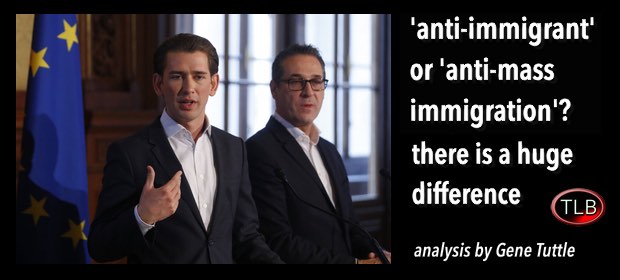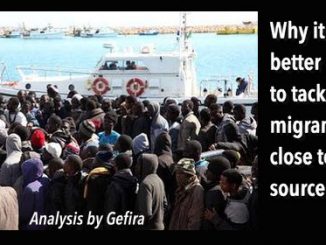
Europe’s Youngest Head of Government Inaugurated in Vienna
On immigration, not all millennial hearts beat to the left
GENE TUTTLE

“Watergate” Carl Bernstein pleasantly surprised me last May by agreeing that widespread use of the “anti-immigrant” mantra often reflected careless journalism. Since our brief exchange at Vienna’s Concordia Press Club coffee bar, news organizations have been applying the term promiscuously to characterize Austria’s newly elected coalition government, sworn in on December 18th. Bernstein, whose talk had been more about President Trump, acknowledged that “anti-mass immigration” was probably a fairer and more accurate label in most cases.
It sounds like nit-picking. But there is a vastly different message conveyed by the failure to differentiate. Those concerned about the large, rapid increase in immigration levels are thrown into the same pot as a small minority of xenophobes who dislike foreigners per se. Both in Germany and in Austria, political parties to the right of the long established center-right ones have made huge gains by addressing the problem outright. Austrian Sebastian Kurz, at 27 Europe’s youngest foreign minister, just became its youngest government head at 31 by following suit and reversing years of losses by his establishment conservative People’s Party (ÖVP). He did so partially by distancing himself on the immigration issue from Germany’s Chancellor Angela Merkel’s “refugee welcome” policies. And by working out a coalition agreement with the right-wing Free Democrats (FPÖ), Kurz is now Merkel’s Austrian counterpart while Merkel — who weeks before Austria’s October election had lost badly in Germany’s own elections — is still struggling to patch together a new government.
Merkel and her conservative Christian Democrats (CDU/CSU) have steadfastly refused to work with the new, right-wing anti-mass immigration Alternative for Deutschland (AfD). As a result, Germany may not have a stable government until long into the New Year. Lengthy coalition talks with smaller German political parties recently fell apart. A major stumbling point was the issue of how many family members the massive numbers of refugees arriving in recent years can bring up from the Middle East.
Germany’s outgoing coalition partner and second largest political party, the Social Democrats (SPD), had immediately foresworn participation in yet another “grand coalition” government. They had suffered an even greater electoral defeat than Merkel’s conservatives. Merkel has shown some readiness to move closer to her “upstart” young Austrian counterpart in taking a slightly tougher stance on migration from across the Mediterranean. But despite the declining support from the SPD’s traditional working class base, Germany’s center-left party so far refuses to go along with Merkel’s modest proposals for greater migrant control.
Austria’s newly successful ÖVP is an exception among Europe’s establishment parties, especially the social democrat varieties who have tried to stem voter loss by accusing competitors to the right of pandering to immigration “fears.” The strategy is a safe way of implying that lost voters are misguided sissies whose reasonableness can be restored and fears relieved through increased government largesse. Liberals, who find it perfectly acceptable to maintain a neighborhood’s character through zoning laws, frequently scorn those resisting neighborhood changes fostered by a mass importation of migrants with radically different social mores. Such immigration liberals usually expect the changes to occur in other peoples’ neighborhoods, where existing residents are less financially equipped to pull up stakes and move elsewhere.
The establishment parties’ former supporters are condescendingly reminded that their societies will not return to the halcyon days when Turkish guest workers were a manageable exception to a more homogeneous European population. Proposed formulae for fending off potential culture clashes with the mostly Muslim new arrivals involve better and more expensive programs for integrating them.
The fixation on integration at the height of the 2015 migrant invasion had led Berlin-based Swiss journalist Frank Meyer in a televised round table discussion to characterize colleagues and politicians across Germany’s broad parliamentary spectrum as part of a common “Glaubensgemeinschaft,” or “community of the faithful.” An article of the common faith, in addition to confidence that governments can effectively integrate newly arrived exotic masses, was that hindering their arrival would be unfair. Barriers should be mitigated, whether man-made or natural. Other EU member states should take in more of the refugees, especially the East Europeans who were never consulted when Merkel initially welcomed the migrant masses.
The “Glaubensgemeinschaft,” comprised of the MSM, establishment political parties from center right and left (as well as the Greens and the far left Linke Party), have been predictably hostile to Austria’s new government, one of the few in the EU to include what some still call an “extreme right” political party. EU government leaders, on the other hand, generally offered polite congratulations to their new Austrian counterparts. That was far from the case the last time Austria’s center and far right parties teamed up in the year 2000. Brussels then imposed diplomatic sanctions on Vienna which were eventually viewed as counterproductive.
The thousands of demonstrators protesting the swearing in of the new government in Vienna, many carrying the ritual anti-Nazi placards, are not likely to maintain the energy of over 17 years ago when marches and demonstrations were held once a week for well over a year. Opponents have had time to get used to a tougher government stance against mass immigration. Kurz as Foreign Minister as well as his former socialist party (SPÖ) senior coalition partners had distanced themselves since 2015 from their parties’ initial embrace of their northern neighbor’s “open door” declaration. Although the SPÖ replaced its chancellor with one who was more amenable to tighter immigration controls, both Kurz and the FPÖ opposition wanted to go much further.
Longer experience might have also helped the FPÖ to avoid some mistakes that dragged their German AfD counterparts into needless additional controversy. Well over a year ago the latter got lured into discussing an ultima ratio scenario that accepted the use of firearms against migrants defying border fences and police orders to halt.
American journalist Sasha Polakow-Suransky is among the legions of Cassandras to point to this and other AfD remarks in supporting the thesis of his new book: “Go Back to Where You Came From: The Backlash Against Immigration and the Fate of Western Democracy.” The remarks are usually taken out of context, as former Financial Times reporter David Goodhart noted in a December debate on Al Jazeera’s “Up Front” program, “moderated” by Mehdi Hasan. Goodhart doesn’t share Suransky’s tendency to equate liberal democracy with tolerance of open borders. In a book of his own, according to an article in the Independent, Goodhart observed that in England “since 2004, more people have arrived each year than in the whole period from 1066 to 1950.” That’s the kind of context that should make critics of the Suransky stripe a bit more understanding of why “far-right populist” parties are cashing in on the backlash.
Such context might also help Mehdi Hasan too! At the Oxford Union a few years ago, Hasan’s aggressive moderation style nearly had the polite Oxford economics professor Paul Collier tongue-tied. Collier, like Goodhart, has serious reservations about the benefit of mass Third World immigration to Europe. In Collier’s own book on the subject, “Exodus,” he used the term “indigenous” British which Hasan, whose parents were from India, found deeply offensive. A less defensive Collier might have suggested that Europeans’ use of tribal nomenclature should be no more offensive than referring to descendents of America’s pre-Columbian inhabitants as indigenous peoples. Although in pushing for such claimed status, without evidence, Massachusetts Senator Elizabeth Warren, aka “Pocahontas,” might have unknowingly reinforced Hasan’s concerns that exclusion from “indigenous status” must incur some disadvantage. A cowed Professor Collier hesitatingly agreed that Hasan was indeed an “indigenous” Brit.
Europe’s left will seize every opportunity to portray Austria’s new government as xenophobic and racist. Vienna will be kept more discretely on the “watch list” of other centrist EU establishment parties. But the self-assurance and tactfulness of Austria’s young new leadership is encouraging.
Karin Kneissl, the country’s new Foreign Minister, has been publically critical of many European leaders whom she’ll now have to work with. But even though she left her short diplomatic career early to work as an independent lecturer and journalist, the skills she acquired should equip her for the challenges ahead. Having taken opposite sides on issues during two TV round table discussions with her, I was reminded of the quip about the ideal diplomat being able to tell someone to go to hell in a way that one will look forward to the trip. As I told an ex-US Assistant Secretary of State for Near East Affairs months later, when introducing Kneissl to him, she had three advantages over me in the debates: German is her native language, she speaks Arabic after having lived in the region, and she was right and I was wrong.
I was wrong as well in assuming that her background as “an Arabist” would have rendered her an apologist for Germany and Austria’s initial encouragement of mass immigration from the Arab world. Her carefully analyzed criticisms, however, surprised many of us and attracted the attention of the FPÖ who eventually nominated the party-independent scholar to head the foreign ministry.
Although one of the EU’s smaller states, Austria may punch above its weight in pushing for reasonable and effective Europe-wide immigration policies. The new government will include strengthening of external border controls, the broadening of refugee status adjudication claims closer to their countries of origin and more robust measures to return migrants whose refugee status claims had been rejected. Former Soviet Bloc countries can probably count on more support in resisting EU measures for what the Germans in particular deem as a fairer distribution of refugees.
And maybe, like Carl Bernstein, the MSM will come to acknowledge the difference between anti-immigration and anti-mass immigration. Hope springs eternal!
************
Original article
ER recommends other articles by The Unz Review
About the author
Gene Tuttle, a retired US diplomat, lives in Vienna Austria







